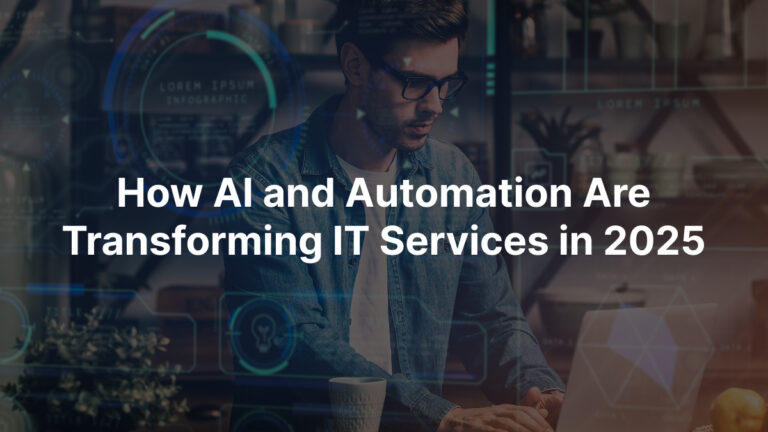
Technology never sleeps — and in 2025, Artificial Intelligence (AI) and automation are leading a new wave of innovation in the IT industry. Businesses are no longer asking if they should adopt AI — they’re asking how fast. From predictive maintenance to intelligent support systems, AI is transforming how IT services are delivered, managed, and […]
Technology never sleeps — and in 2025, Artificial Intelligence (AI) and automation are leading a new wave of innovation in the IT industry. Businesses are no longer asking if they should adopt AI — they’re asking how fast. From predictive maintenance to intelligent support systems, AI is transforming how IT services are delivered, managed, and scaled.
In this blog, we’ll explore how AI and automation are reshaping IT services — and what it means for businesses ready to embrace the future.
1. AI-Powered IT Support: From Reactive to Proactive
Traditional IT support often revolves around users reporting issues — but AI changes the game. AI-powered systems can detect and resolve issues before they impact users.
Examples:
- Chatbots and virtual assistants provide 24/7 support for common issues.
- Predictive analytics monitors performance to catch failures early.
- Automated ticketing systems assign tasks intelligently based on issue type and urgency.
Result: Faster response times, reduced downtime, and better customer satisfaction.
2. Automation of Repetitive Tasks
IT teams spend a significant amount of time on repetitive tasks like system updates, patch management, data backups, and account provisioning. With automation tools, these tasks can be done in the background — accurately and consistently.
Tasks Being Automated:
- Server provisioning and configuration
- Software updates and patching
- User onboarding and offboarding
- Data synchronization and reporting
Result: Saves time, reduces human error, and lets your team focus on high-value work.
3. AI in Cybersecurity
Cyber threats are more sophisticated — but so is AI. In 2025, AI-driven cybersecurity is becoming the first line of defense for many organizations.
How AI Enhances Security:
- Anomaly detection: AI systems detect unusual network behavior in real-time.
- Threat intelligence: AI aggregates data from global attack patterns to identify new risks.
- Automated incident response: AI can isolate affected systems or block IPs immediately.
Result: Stronger, faster, and more adaptive security systems.
. Smart Infrastructure & Cloud Optimization
AI helps optimize your cloud infrastructure by analyzing usage patterns and making intelligent adjustments. It can scale services automatically based on demand, suggest cost-saving configurations, or even predict system failures.
Examples:
- Dynamic server scaling
- Automated cloud resource cleanup
- Smart load balancing
Result: Improved performance and significant cost savings.
5. AI in IT Analytics & Decision Making
One of AI’s most powerful abilities is turning raw data into smart decisions. IT managers can now use AI-based dashboards to visualize KPIs, track system health, and forecast future needs.
Benefits:
- Real-time dashboards powered by AI
- Decision-making based on trends and predictive modeling
- Resource planning and capacity forecasting
Result: Data-backed decisions lead to better performance and reduced costs.
6. AI Enhancing User Experience (UX)
AI isn’t just improving backend systems — it’s transforming how end-users interact with technology.
Examples:
- Self-healing applications that fix themselves without user input
- Personalized user experiences based on behavior
- Voice-assisted troubleshooting
Result: Smoother, smarter, and more intuitive tech experiences for users.
Final Thoughts: The Future Is Now
AI and automation are no longer emerging trends — they are essential tools for modern IT. Businesses that embrace these technologies will gain a competitive edge with increased efficiency, stronger security, and smarter decision-making.
At Dzainstudio, we help companies integrate AI-powered solutions that future-proof their IT operations.
